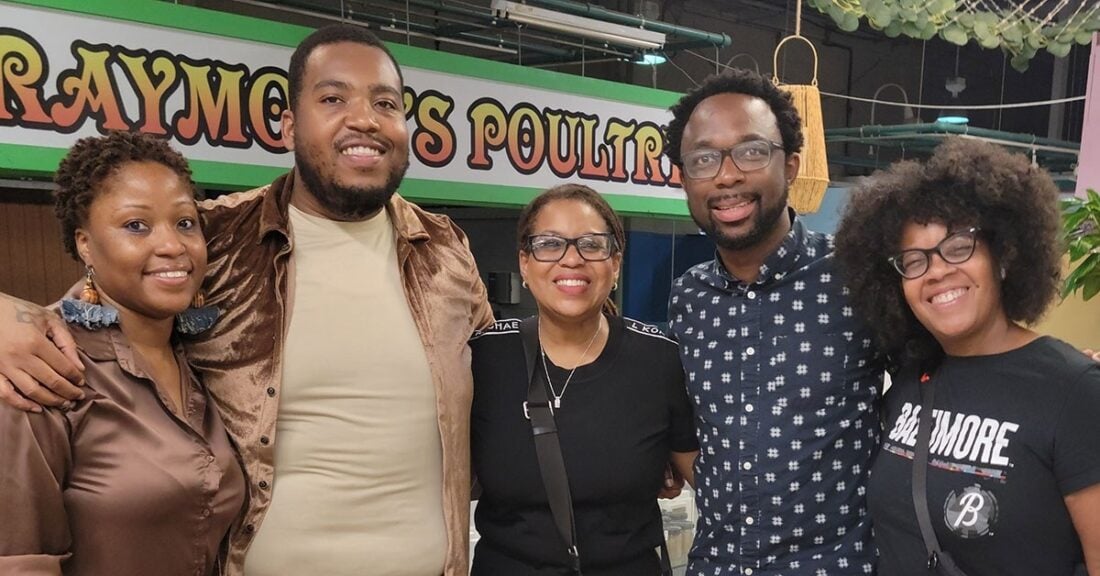Investing in Social Entrepreneurs

From left: April and Tyron Harper, owners of Harp Vision; Gina Merritt, an executive mentor for Innovation Works; Jay Nwachu, Innovation Works president & CEO; and Susan Clayton, an Innovation Works investee
Jay Nwachu is in the ideas business.
Over the past three years, his Baltimore-based nonprofit, Ignite Capital, has launched several businesses, including:
- a maker of luxury comfort shoes;
- a high-quality child care operation;
- a clergy and choir apparel company; and
- creators of affordable homeownership opportunities from converted abandoned properties.
Nwachu invests in entrepreneurs of color with ideas that aim to improve lives and communities but who are light on cash. Enterprises in Ignite Capital’s portfolio typically are unable to obtain traditional bank loans or venture capital funding. The nonprofit fills in the gap with an investment pool supported by the Annie E. Casey Foundation’s social investments — often referred to as impact investing.
Building Wealth and Social Impact
The Foundation’s investment in Ignite Capital is categorized as a program-related investment (PRI). These types of impact investments generally last from five to 10 years at interest rates well below the market. Casey considers several criteria for investing in funds, including:
- advancement of the Foundation’s mission to strengthen families, build stronger communities or ensure access to economic opportunity in the United States;
- improvement of the lives of children and families in a way that promotes improved educational, economic and social well-being and health outcomes;
- demonstration of strong management, financial strength and feasibility of the proposed project or strategy;
- demonstration of potential influence, innovation and replication; and
- operations in areas of geographic significance to the Foundation.
Casey’s $237 million impact investing program consists of 42 investments, including community and economic development at Atlanta’s Pittsburgh Yards. Last year, the Foundation completed its commitment to the East Baltimore Development Inc., which was its largest-ever investment. In addition to community and economic development, the Foundation’s investment program promotes quality jobs, affordable housing and financial inclusion.
“Impact investing is unique and flexible,” says Tracy Kartye, director of the Foundation’s Social Investments team. “Social enterprises, businesses that have a social purpose as part of their mission, can be a viable means to building wealth for owners and a source for local jobs in addition to their social impact. Investing in Ignite Capital enables the Foundation to contribute to building a more robust entrepreneurial ecosystem in Baltimore.”
Each business in Ignite Capital’s portfolio goes through an accelerator program operated by Innovation Works, its parent organization.
Innovation Works was founded by Frank Knott and local Jesuit leaders in Baltimore in 2017. The organization wanted to invest in historically disinvested communities. Its mission is to reduce the city’s neighborhood and racial wealth divide by supporting leaders of social enterprises who work to build economic sustainability in communities. Business leaders develop their ideas with Innovation Works’ mentors assigned to help them navigate obstacles, then they advance to the next step. With Casey’s $500,000 investment, Ignite Capital finances the businesses that are ready to launch.
Advancing Mission-Based Entrepreneurism
Nwachu serves as president and CEO of both Ignite Capital and Innovation Works. He says, “Baltimore has seen a sharp increase in mission-minded entrepreneurism. Years ago, I watched people start things and were unable to finish.” Accelerator programs like Innovation Works help social entrepreneurs become investment-ready so they can develop their models and build trust.
He brought a career in talent acquisition and management to Innovation Works. The Lagos, Nigeria, native’s first social venture was an organization supporting social enterprises on the African continent. He partnered with his wife on the project.
Nwachu’s first social enterprise investment at Ignite Capital was Parity Homes, a residential real estate investment organization in West Baltimore’s Harlem Park headed by Bree Jones, a young Black woman who brought an idea for neighborhood revitalization from New Rochelle, New York. Nwachu said Jones had an innovative idea for a social enterprise but was unable to get funding and the network of resources she needed.
At Innovation Works, she was matched with former Baltimore County Executive Jim Smith as her mentor. She received funding from Ignite Capital and is now on a path to renovating 96 vacant properties in a contiguous 10-block area of Harlem Park.
Nwachu said a higher goal of Ignite Capital is to help social enterprises understand and ultimately access the wide array of capital resources, including banks, venture capital Community Development Financial Institutions and microlending.
“We are here to answer the question of how to put your enterprise in a position to attract capital in a number of ways — and not just from us,” Nwachu says. “Black social entrepreneurs need investment from us to get things going and to get to the next level as we work toward our ultimate goal of reducing the racial wealth gap in Baltimore.”





